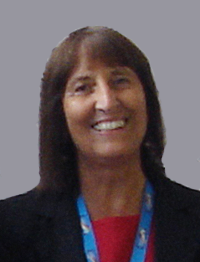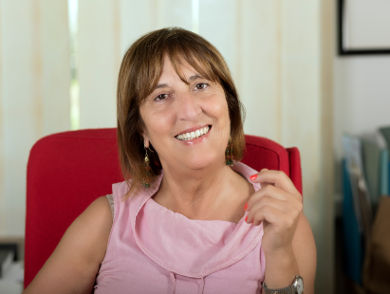Professor Angela Agostiano, University of Bari, Italy, has been President of the Italian Chemical Society (SCI, Società Chimica Italiana) since last year. Here she talks to Dr. Vera Koester for ChemViews Magazine about the SCI, her plans for her three-year presidency, what is most important to her, and what has inspired her throughout her career.
How would you describe your society?
The Italian Chemical Society (SCI; Società Chimica Italiana) is the national association in Italy linking chemists mainly from universities but also from schools and industry.
The society is a place of communication. Here, people meet, share their problems and ideas, and we can speak with a unique voice to people outside of the community. We communicate and connect with a wide range of people and organizations: We try to reach politicians and school children, we cooperate with the National Research Council of Italy (Consiglio Nazionale delle Ricerche, CNR) in preparing several conferences or meetings, with EuCheMS, with the German Chemical Society (GDCh), in programs such as the Ziegler Natta lecture and the recently established Primo Levi prize, and with the European societies of ChemPubSoc Europe to publish a growing family of journals.
We have a lot of young members. We try to help them with grants to go to conferences and we have a special session in which we prepare young chemists for their jobs, give them advice on how to write applications, how to read the literature, how to get funding, and so forth.
We are also trying to share ethical considerations in chemical activities. Chemistry has to work for people, not against people. So our awareness as chemists for our professional responsibility must be raised. Scientific progress should serve environmental integrity and societal and individual well-being. We want to be an opposition to the proliferation of arms, to climate change, some bad uses of chemistry, and we want to teach people that chemistry can help people to live better lives and let them know why they can trust us. This is the main thing for me. We try to tell young people in particular that chemistry is not something they have to be ashamed of; they have to be proud because it is a strong discipline. We can offer the world a lot to help it become a better place. However, we also introduce some problems that we have to face together and share our experiences, and the SCI is a place where this happens.
You have mentioned the younger members. Do you have a program for them?
We have a group of young people under 35. There are more than 1500 young chemists that make up almost half of our society. They are very active. They prepare a lot of different events throughout the year, for example, they organize workshops on how to publish and write papers, on ethics, on how to prepare a CV for industry, and on entrepreneurship.
Alice Soldà, an Italian Ph.D. student from our Electrochemical Division, is now the Chair of the EYCN, the group of young chemists in EuCheMS. Together with EYCN, we are preparing a special group for dissemination of the chemical culture. The idea is to go and talk with children in elementary, middle, and high schools in Italy. The students don’t study chemistry in elementary school. They start with a little bit in middle school and then more at high school. This is too late. Many will already have a bad impression of chemistry by then. They grow up with the idea that chemistry is boring, something very difficult to study, very tough, and that it is related only to pollution and danger.
Instead, we want to talk as early as elementary school about the nice parts of chemistry, what chemistry has done for us in the past, what chemistry can do now, about medicine, the preservation of cultural heritage, and also about the beauty of chemistry. Young people have to be enthusiastic about chemistry. It would be really great if they believe that they can invent something.
Do you have other programs to reach out to the general public?
Yes, we do, and it is a very important topic to us to communicate science in an appropriate way to laypeople to address public concerns about scientific advances. We are creating an interdisciplinary group for the dissemination of the culture of chemistry. Chemistry is not only a science but a major factor in the development of culture. In addition to reaching out to schools as described above, we also want to organize a special event with the CNR. Different people should talk about chemistry, what chemistry has done for us, for sustainable progress, societal well-being, and economic wealth. I would like to do this in the National Cinema Museum, the movie theater museum and cinema in the Mole Antonelliana tower in Turin. We will also try to reach television.
All of our conferences, such as at the Congresso Nazionale della Società Chimica Italiana in Paestum, Italy, in 2017, always have something of interest to the general public and so we open some of the discussions to the general public.
Another project is carried out by our senior group. They are working a lot on ethics and the preservation of cultural heritage. They are currently organizing events in churches or in other public buildings. However, there are not as many people reached by these kinds of events.
We also need to find a way to reach young people through Facebook, Twitter, and other forms of social media.
Are you using social media?
Only the young group is. They are going to assist us in starting to use Facebook, Twitter, and also YouTube with the Italian Chemical Society. Especially with the advent of lots of fake news, we feel that we need to also tell our truth.
What programs do you have to attract young members?
We are very good at attracting young members. They do not pay a membership fee if they have a good degree, and we offer a lot of grants for them to go to conferences, for example. Two years ago, we paid for 38 Italian researchers to go to the EuCheMS conference in Sevilla, Spain. We offer a lot of help to young researchers with their careers. We recognize their outstanding achievements with important awards. And chemists such as Luisa DeCola, now at the University of Strasbourg, France, for example, do a lot for young chemists. She has held a lot of talks on the chemistry of chocolate. And actually, the young people are the most active part of the society.
However, most of the young researchers only stay in the society until they finish their Ph.D. or postdoc and find a job in industry or move abroad because they do not see much advantage to staying in the society then. It is a problem that there is no money for research in Italy and so our best researchers are moving abroad.
What would you say is the biggest challenge of your society?
For me, a big challenge is to modify the relationship between chemistry and society because this is the main problem. Many people don’t feel that society is benefitting from chemistry.
The second goal is that we have to become more politically active. Having good contact with politicians is important. Politicians involved in making laws should be encouraged to ask us about special problems related to chemistry. My vision is to open this building [the headquarters of the Italian Chemical Society in Rome] up for discussions and meetings and to increase the number of people that see this building and are in contact with this society; to generate an open place.
In addition, to become more attractive to chemists from industry, we want to intensify our cooperation with industry and to establish a joint conference.
For a chemical society today, it is also very important to have a position on the bad that is happening around us, such as pollution. We need to take responsibility for both the desirable and good and the despicable and bad, both the intended and unintended chemistry that chemists can create. For instance, we are a member of the Organisation for the Prohibition of Chemical Weapons (PPCW). Ferruccio Trifirò, University de Bologna, Italy, is a member of the Scientific Advisory Board of the PPCW. It is an organization of 95 different countries.
How important are international cooperations for the Italian Chemical Society?
Very important and we have many of them. We are closely connected with EuCheMS. Quite a few presidents of the EuCheMS divisions are Italian, for example, Gianluca Farinola, a young professor from the University of Bari, will be the new president of the Organic Chemistry Division of EuCheMS, the Society of European Organic Chemists. He will assume the new position starting from September.
With ChemPubSoc Europe we publish journals together with other European chemical societies such as Chemistry – A European Journal and ChemSusChem.
What got you interested in chemistry?
Actually, I wanted to study medicine, but my family was from the south of Italy and studying medicine took a long time and you needed a lot of money, so my father asked me to please, if I could, do something else. And I, without understanding too much, thought that chemistry was the most similar thing to medicine. I had a classical school education, and learned Greek and Latin.
Who has inspired you most during your career?
My professor, Mario della Monica inspired me to follow this discipline in research. He was a professor of electrochemistry and was fantastic as a person. He was very excited about research and about teaching. He made me realize how beautiful chemistry is. Not only the chemical reactions are beautiful but also the idea that everything in nature, anything you wear or eat is chemistry.
The inspiration for my personal career came also from the fact that chemistry is a community. For me, the Italian Chemical Society was really a link to meeting other people, to create relationships, to exchange ideas, and also to get support, including financial support. My research became more and more interdisciplinary and more and more international. Moving from a really small town in southern Italy I found in the community something that helped me to feel at home, both national and international.
In addition, I always believed that science is like a barrier against intolerance and racism. This is why the Primo Levi International prize that we organized together with the German Chemical Society is so important to me – and to the society. The award is provided by two societies from countries that have a strong history against people with discrimination, intolerance, and racism. These two societies together decided to give a prize to chemists who show human character. I think that is fantastic.
What motivates you?
Fighting against discrimination is my life motto.
If you could have dinner with a famous chemist, one from Italy and one international one, who would you choose?
From Italy from the past, I would choose Cannizzaro [comment of Editor: Stanislao Cannizzaro (1826–1910) is remembered today largely for the Cannizzaro reaction and for his influential role in the atomic-weight deliberations of the Karlsruhe Congress in 1860]. For me he is not only an important chemist, he was also a fighter. He was not only a researcher in his lab, he was fighting during the Risorgimento [the political and social movement that consolidated different states of the Italian peninsula into the single state of the Kingdom of Italy in the 19th century]. Later he was also on duty as a member of the Senate. For me, the figure of Cannizzaro is what I believe a scientist should be: not only good in his work but also good in transferring what he knows in order to change society.
I also like Roald Hoffman for different aspects: Of course, he is a Nobel prize winner; his work is important for the discipline of chemistry. But his ethical attitude regarding humanity is important as well. In addition, he is working on theater communication, conveying to young people the idea to be tolerant, and he uses the sciences to communicate with people from different backgrounds.
What do you do in your spare time?
There is not much spare time. Because as Italian President I am still on duty at my university. The time is very short. But what I really do in my spare time is stay with friends. I have a lot of friends. I am always accumulating friends, from when I was in school, from university, from my political years … My preferred sports is meeting friends, to talk with them and to spend time with them.
I also like to talk with my young daughter about the music she likes to listen to. So, I follow her in what she is listening to, new groups that are far away from my idea of music, but I follow them because I want to talk with her about what they are playing.
Thank you very much for the interview.

Angela Agostiano studied chemistry at the University of Bari, Italy. After a postdoctoral stay at Purdue University, West Lafayette, IA, USA, from 1985 to 1987, she became a full professor at the University of Bari.
Currently, Angela Agostiano is Head of the Bari division of the CNR-IPCF (Institute for Physico-Chemical Processes of the National Council of Research) and president of the Italian Chemical Society (SCI).
Professor Agostiano’s research interests include preparing and characterizing nanosized semiconductors for photochemical, environmental, and sensing applications, assembling nanocrystals in organized structures or polymer matrixes, and isolating and investigating biomaterials involved in biological energy transduction and molecular recognition.
Selected Articles
- P. Davide Cozzoli, Roberto Comparelli, Elisabetta Fanizza, M. Lucia Curri, Angela Agostiano, Danièle Laub, Photocatalytic Synthesis of Silver Nanoparticles Stabilized by TiO2 Nanorods: A Semiconductor/Metal Nanocomposite in Homogeneous Nonpolar Solution, J. Am. Chem. Soc. 2004, 126(12), 3868–3879. https://doi.org/10.1021/ja0395846
- C. Ingrosso, E. Sardella, S. Keller, S. Dohn, M. Striccoli, A. Agostiano, A. Boisen, M. L. Curri, Surface Functionalization of Epoxy-Resist- Based Microcantilevers with Iron Oxide Nanocrystals, Adv. Mater. 2010, 22(30), 3288–3292. https://doi.org/10.1002/adma.200904013
- Francesco Milano, Rocco Roberto Tangorra, Omar Hassan Omar, Roberta Ragni, Alessandra Operamolla, Angela Agostiano, Gianluca M. Farinola, Massimo Trotta, Enhancing the Light Harvesting Capability of a Photosynthetic Reaction Center by a Tailored Molecular Fluorophore, Angew. Chem. Int. Ed. 2012, 51, 11019–11023. https://doi.org/10.1002/anie.201203404
- Gianpiero Valente, Nicoletta DepaloIvan de Paola, Rosa Maria Iacobazzi, Nunzio Denora, Valentino Laquintana, Roberto Comparelli, Emiliano Altamura, Tiziana Latronico, Michele Altomare, Elisabetta Fanizza, Marinella Striccoli, Angela Agostiano, Michele Saviano, Annarita Del Gatto, Laura Zaccaro, Maria Lucia Curri, Integrin-targeting with peptide-bioconjugated semiconductor-magnetic nanocrystalline heterostructures, Nano Res. 2016, 9(3), 644–662. https://doi.org/10.1007/s12274-015-0944-2
- F. Petronella, A.Truppia, C.Ingrosso, T. Placido, M. Striccoli, M. L. Curri, A. Agostiano, R.Comparelli, Nanocomposite materials for photocatalytic degradation of pollutants, Cat. Today 2017, 281, 85–100. https://doi.org/10.1016/j.cattod.2016.05.048




